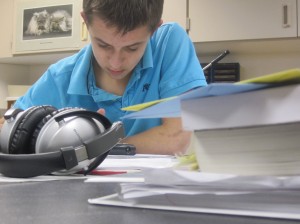All it takes is a little “s.”
Students at Penn Manor High School discovered Thursday a new way to access their social networking websites.
And they were, every chance they got.
“It’s exhilarating because it’s supposed to be a restricted site, but now we can be able to have access,” said senior Julia Rios.

Putting in “https://” instead of just “http://” ahead of the address, students were able to access the sites. To jump from page to page, the students figured out to add the “s” to the “http” before they pressed “enter.”
“Well it’s kinda cool that you can get on Facebook at school, but I don’t think the school knows about it yet,” Alex Kirk, a junior, stated.
Interestingly, students were using Facebook at school to spread the word that it was available at school.
Social studies teacher Matthew Scheuing found out Friday by accident when he Googled a friend’s name and the friend’s Facebook page popped up. He was able to click on it and get in.
“Technology is constantly evolving,” said Scheuing. “It’s all about figuring out the ‘next thing.’ People always seem to find out a way to get around it.”
Not only can students get on their Facebook page, but they can also get onto Twitter, Myspace, YouTube, and many other websites. E-mailing websites were still being blocked by the filter.
But are students willing to take the risk of getting caught and in trouble, just to get onto to check their pages?
“I wanted to get on once I found out, but I am afraid to get caught,” Rios also said, “but that is what makes it more appealing.”
However the administration is not quite sure how they are going to approach this situation, since the students are sometimes one step ahead of them.
“I think in this situation there’s a dilemma educators face when students need to use technology in the classroom, but the negatives arise when the students don’t use it appropriately,” Principal Phil Gale said.
“I don’t think they (administration) would allow it because it’s a pretty big distraction and it would take away from the class and it wouldn’t be good for grades and class work,” Kirk said.
“I feel like I’m not going to get anything done,” said Ella Perry.
“It is not good because kids are going to get distracted,” Mikah Farbo stated.
“I kind of don’t care, it’s not that fantastic,” senior Steph Slagel said, “I don’t need to get on Facebook in school.”
“We haven’t really looked at that (punishment), we’ve been pretty much been trying to figure out what is going on,” Gale stated.
By Jordann Stekervetz
Robert Henry and Alex Geli contributed to this report
















